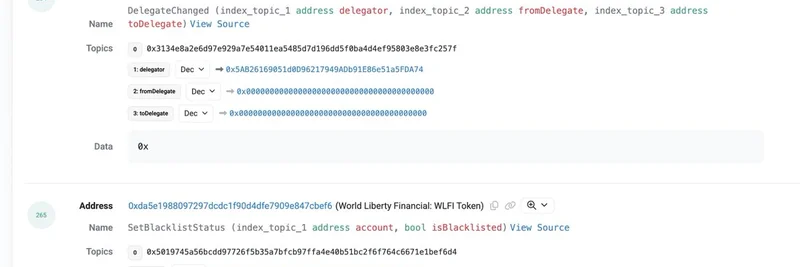In the fast-paced world of cryptocurrency, where meme tokens often blend hype with high-stakes drama, a fresh controversy has erupted around World Liberty Financial ($WLFI). This Trump family-backed DeFi project, aimed at revolutionizing finance with blockchain tech, just made headlines by blacklisting a major wallet linked to TRON founder Justin Sun. The move, spotted by on-chain analytics firm Spot On Chain, has locked up millions in $WLFI tokens and fueled speculation about market manipulation.
What Happened: The Blacklist Breakdown
According to a tweet from Spot On Chain, the World Liberty Financial team blacklisted the TRON DAO wallet (address starting with 0x5AB261...) on the $WLFI token contract. This occurred roughly eight hours before the post, effectively freezing the wallet's ability to transfer its holdings.
The wallet in question had snapped up a whopping 3 billion $WLFI tokens during the project's ICO. It then unlocked 600 million of them and transferred about 54 million $WLFI—valued at around $11 million at the time—to new wallets. By blacklisting it, the team has locked the remaining funds in place, preventing any further movement.
This screenshot from the transaction logs highlights the "SetBlackListStatus" event, confirming the wallet's blacklisted status as "True." It's a stark reminder of how smart contract admins can wield power in supposedly decentralized systems.
Reports from outlets like The Block and CoinDesk corroborate the details, noting that the transferred tokens may have been dumped on exchanges like HTX (formerly Huobi), which has ties to Sun. This alleged dumping is blamed for contributing to a sharp decline in $WLFI's price, which dropped over 16% in recent hours.
Justin Sun, for his part, has denied the dumping allegations, but the blacklist sends a clear message: no tolerance for actions that could harm the project's integrity, even from big players.
Background on $WLFI and World Liberty Financial
For those new to the scene, World Liberty Financial is a cryptocurrency initiative launched by former U.S. President Donald Trump and his family. Billed as a DeFi platform for borrowing, lending, and trading, it positions itself as a tool for financial freedom. The $WLFI token serves as its governance asset, giving holders a say in protocol decisions—though, as this incident shows, central controls like blacklisting remain in play.
While not a pure meme token like Dogecoin or Pepe, $WLFI carries meme-like vibes due to its political branding and viral marketing. It's attracted a mix of crypto enthusiasts, Trump supporters, and speculators, making it a hot topic in the meme token knowledge base here at Meme Insider.
The project's ICO drew massive attention, but centralized features have sparked criticism. As one reply to the Spot On Chain tweet quipped, "So much for decentralization 😂"—highlighting the irony in a "liberty"-themed project using admin powers to freeze assets.
Implications for the Meme Token Ecosystem
This drama underscores key risks in the meme token and DeFi space. Blacklisting, a feature in some token contracts, allows creators to prevent certain addresses from transacting—often to combat scams or hacks. But when used against a prominent figure like Sun, it raises questions about fairness and true decentralization.
For $WLFI holders, the price dip is a setback, but the project's backers argue it's necessary to protect the community from manipulation. As Cointelegraph reported, the blacklist froze about 540 million unlocked tokens plus 2.4 billion locked ones, totaling over $100 million in value.
In the broader meme token world, events like this remind us why on-chain transparency matters. Tools like Spot On Chain help track whale movements, empowering retail investors to stay informed. If you're diving into meme tokens, always check contract details for admin keys or blacklist functions—they can make or break a project's trustworthiness.
Community Reactions and What's Next
The tweet sparked varied responses. One user called it a "clear message: no tolerance for market manipulation," while another lamented the centralization risks in DeFi. Even a simple "scam" reply popped up, reflecting the skepticism that plagues hyped projects.
As World Liberty Financial navigates this fallout, eyes are on whether $WLFI can rebound. For meme token enthusiasts, this is another chapter in the wild ride of crypto—where politics, tech, and speculation collide.
Stay tuned to Meme Insider for more updates on $WLFI and other trending tokens. If you've got thoughts on this drama, drop them in the comments!



